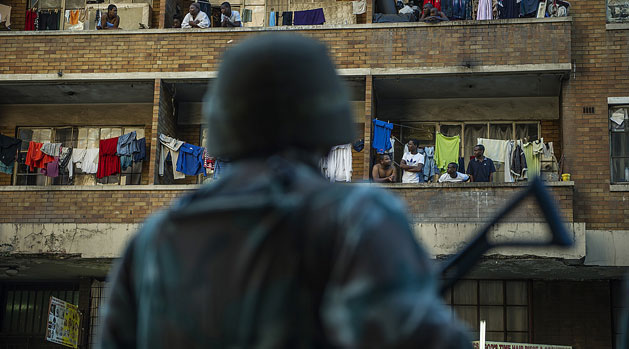South Africa and Nigeria clash over xenophobic violence
'Diplomatic tit-for tat' intensifies as Pretoria issues strongly worded statement criticising Nigeria

A free daily email with the biggest news stories of the day – and the best features from TheWeek.com
You are now subscribed
Your newsletter sign-up was successful
South Africa has criticised Nigeria for recalling its ambassador in the wake of a wave of xenophobic violence in the country, calling it an "unfortunate and regrettable step".
In a strongly worded statement, Pretoria said: "If this action is based on the incidents of attacks on foreign nationals in some parts of our country, it would be curious for a sisterly country to want to exploit such a painful episode for whatever agenda."
South Africa's government spokesman, Clayson Monyela, appeared to fan the flames further when he added that his country did not blame Nigeria "for the deaths and more than nine months delay in the repatriation of the bodies of our fallen compatriots" following the collapse of a building in Lagos last year. This "particularly snarky" media statement is the latest round in an ongoing "diplomatic tit-for-tat", says Quartz.
The Week
Escape your echo chamber. Get the facts behind the news, plus analysis from multiple perspectives.

Sign up for The Week's Free Newsletters
From our morning news briefing to a weekly Good News Newsletter, get the best of The Week delivered directly to your inbox.
From our morning news briefing to a weekly Good News Newsletter, get the best of The Week delivered directly to your inbox.
However, Nigeria's deputy foreign minister Musiliu Obanikoro insists that Acting High Commissioner Martin Cobham and his deputy had not been recalled indefinitely. He tweeted that Cobham had merely been summoned back to Nigeria for consultation.
The xenophobic violence, which began in the port city of Durban and spread to Johannesburg, left at least seven people dead. Locals targeted homes and businesses owned by foreigners, particularly targeting migrants from other parts of Africa.
The violence has heightened "us and them" attitudes, creating bitterness and resentment among countries that hosted thousands of South African exiles during Apartheid, The Guardian reports.
Last week, Nigerian MPs put forward a motion – which was later defeated - to sever all diplomatic ties with South Africa, as mass protests took place across Nigeria.
A free daily email with the biggest news stories of the day – and the best features from TheWeek.com
South African businesses have also been threatened with closure unless action is taken to prevent further violence. Several multinational firms have significant interests in Nigeria, which overtook South Africa as the continent's biggest economy last year.
-
 Political cartoons for February 20
Political cartoons for February 20Cartoons Friday’s political cartoons include just the ice, winter games, and more
-
 Sepsis ‘breakthrough’: the world’s first targeted treatment?
Sepsis ‘breakthrough’: the world’s first targeted treatment?The Explainer New drug could reverse effects of sepsis, rather than trying to treat infection with antibiotics
-
 James Van Der Beek obituary: fresh-faced Dawson’s Creek star
James Van Der Beek obituary: fresh-faced Dawson’s Creek starIn The Spotlight Van Der Beek fronted one of the most successful teen dramas of the 90s – but his Dawson fame proved a double-edged sword
-
 Epstein files topple law CEO, roil UK government
Epstein files topple law CEO, roil UK governmentSpeed Read Peter Mandelson, Britain’s former ambassador to the US, is caught up in the scandal
-
 Iran and US prepare to meet after skirmishes
Iran and US prepare to meet after skirmishesSpeed Read The incident comes amid heightened tensions in the Middle East
-
 Israel retrieves final hostage’s body from Gaza
Israel retrieves final hostage’s body from GazaSpeed Read The 24-year-old police officer was killed during the initial Hamas attack
-
 China’s Xi targets top general in growing purge
China’s Xi targets top general in growing purgeSpeed Read Zhang Youxia is being investigated over ‘grave violations’ of the law
-
 Panama and Canada are negotiating over a crucial copper mine
Panama and Canada are negotiating over a crucial copper mineIn the Spotlight Panama is set to make a final decision on the mine this summer
-
 Why Greenland’s natural resources are nearly impossible to mine
Why Greenland’s natural resources are nearly impossible to mineThe Explainer The country’s natural landscape makes the task extremely difficult
-
 Iran cuts internet as protests escalate
Iran cuts internet as protests escalateSpeed Reada Government buildings across the country have been set on fire
-
 US nabs ‘shadow’ tanker claimed by Russia
US nabs ‘shadow’ tanker claimed by RussiaSpeed Read The ship was one of two vessels seized by the US military